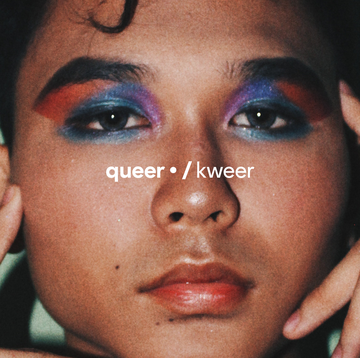The term “sex-repulsed” is most commonly used within the asexual community, but it’s not a marker of asexuality. In fact, while there can be a lot of sex-repulsed asexual people, the two do not need to be mutually exclusive, says asexuality activist Yasmin Benoit, cofounder of International Asexuality Day on April 6.
But in order to understand the term “sex-repulsed,” you must familiarize yourself with what it means to be asexual first.
Remember, “asexual” is an umbrella term used to describe someone who experiences little to no sexual attraction to people of any gender. Because asexuality is a sexual orientation, asexuality exists on a spectrum, so it can range for every asexual person, and there is no one way to be asexual.
It’s important to note that being asexual is different than being celibate, which is choosing to abstain from sex for religious/moral reasons; being aromantic, which is not experiencing romantic attraction or desires; experiencing sexual dysfunctions, and/or having a low sex drive.
What Does It Mean to Be Sex-Repulsed?
In terms of a definition, “asexual” is a sexual identity—like being bisexual or gay—and “sex-repulsed” is a term used to describe the lived experience of being put off by sex.
In other words, “sex-repulsed is a way of experiencing one’s sexuality, but it’s not a sexuality in and of itself,” says Sarah Costello, cohost of aromantic and asexual podcast Sounds Fake but Okay.
Sex-repulsion can mean someone finds sex disgusting or revolting, says Costello. “In general, a sex-repulsed person would likely not want to look at, hear about, talk about, or think about sex or any sexual activity,” she notes.
Benoit adds that “sex-repulsed” can also describe people who are just uninterested in sex or find it undesirable. The reason for sex-repulsion can be circumstantial, contextual, psychological, medical, or related to past trauma.
Signs You Could Be Sex-Repulsed
If you’re sex-repulsed, you may already know that you are, says Costello. In general, “if you don’t like to think about or engage with sexual activity at all and, in fact, find it revolting to do so, you’re probably sex-repulsed,” she says.
But because sex-repulsion looks and feels different for everyone and there are no telltale signs that you are sex-repulsed, here are some common experiences that could indicate you are sex-repulsed, according to Benoit:
- You have negative feelings or reactions to sexual things, whether in your life, on TV, in a book or magazine, or overhearing conversations about sex around you.
- You avoid sex and sex-related topics or situations.
- You feel uncomfortable, disgusted, or fearful in sexual situations or when you’re exposed to sex or sexual things.
- You experience physical reactions like cringing, shaking, nausea, or pain in a sexual situation or when you encounter sexual things.
Again, though, there are varying degrees to these experiences. You may be sex-repulsed and not experience any of these things.
The Differences Between Sex-Repulsed, Asexuality, Sex-Aversion, Sex-Neutrality, and Sex-Negativity
Asexuality is a sexual orientation that encompasses a number of different identities and experiences. “Like all of sexuality, it’s a spectrum (or an umbrella) to a degree, but everyone who falls under it has the similar experience of experiencing a lack of sexual attraction and/or sexual desire toward other people, regardless of their gender,” says Benoit.
Benoit adds that being asexual has nothing to do with often you have sex, your sexual history, or how you feel about other people having sex or expressing their sexuality. Some asexual people enjoy masturbating, watching porn, and/or engaging in some types of sexual encounters. Some feel uninterested in sex, some may be sex-repulsed, and some do have sex.
Sex-averse is another common term in the asexual community. In some ways, it’s very similar to sex-repulsed, but it’s more about one’s personal involvement in a sexual encounter. “‘Sex-averse’ describes those who have negative feelings regarding the idea of oneself being in a sexual situation, so it isn’t general,” says Benoit.
“I’d personally consider myself as being sex-averse because I’m completely fine seeing or engaging with sexual things, but the idea of actually having sex myself doesn’t appeal to me at all.”
The difference here is while a sex-repulsed person may be disgusted or uninterested in a sex scene in a movie, a sex-averse person may be more comfortable seeing or hearing about sexual things, just not participating in them.
As for sex-neutrality, this generally means that someone has a neutral or indifferent reaction to sex or things of a sexual nature. “If you’re uncomfortable with sex, on the fence about it, or just confused about how you feel about it, you might be sex-averse or sex-neutral,” Costello says.
And then the term “sex-negativity” is more of a moral or societal judgment of sex in general. This could be judging certain sexual behaviors, sex work, pornography, or masturbation.
Benoit and Costello say that being sex-repulsed, -averse, -neutral, or any other asexual identity is not the same as being sex-negative.
“They might be averse to themselves taking part in sexual activity, but that is not the same as trying to police other people’s sexual activity,” Costello says.
Reminder: You Can Be Both Sex-Repulsed and Sex-Positive
Benoit says that “sex-positivity” means different things to different people, but the mainstream idea of being sex-positive is often synonymous with having lots of sex. However, this idea is harmful to everyone—but especially people on the asexuality spectrum in particular, says Benoit. “Not everyone has that experience or that need, and liberation comes from a lot more than that.”
Costello adds that equating sex-positivity with having lots of sex or being really excited about sex sets a harmful precedent that sex-repulsed people are “anti-feminist” or “frigid.”
“Bodily autonomy includes having the autonomy to choose not to have sex, have very little sex, or only have a specific type of sex, for whatever reason, no questions asked,” Costello says. “‘Sex-positivity’ really ought to be about having as much, or as little, consensual sex as a person wishes.”
What to Do if You Think You’re Sex-Repulsed
Everyone navigates their asexuality differently, but all experiences are real, “normal,” and valid. “Discovering anything new about yourself isn’t a bad thing, even if it seems that way,” says Benoit. “You now have a new tool to understanding yourself and your experience, one that can make articulating that and managing it a lot easier.”
Benoit adds that if you’re sex-repulsed or trying to learn more about what it means to be sex-repulsed, it can be helpful to find others that can relate to you.
“Look around online for some other sex-repulsed people who you can talk to. Being able to connect with someone about an experience that is rarely talked about can be very affirming,” Benoit says.
There are a number of online resources for asexual people, like Sounds Fake but Okay, Slice of Ace, and Shower Thoughts With an Asexual. Additionally, you may be able to find both IRL and online community on sites like LGBTA Wiki and Ace Week. Benoit started the #ThisIsWhatAsexualLooksLike campaign, which connects people on the asexual spectrum all over the world.
Additionally, some dating sites like OkCupid have asexual and aromantic options when making a profile.
Finally, if you’re thinking about telling your friends and family that you’re sex-repulsed, Benoit encourages you to put yourself first and stay in your comfort zone.
“You don’t owe anyone an explanation as to ‘why,’” she says. “Some don’t know why, and even if they do, it can often be a very personal reason. You can give someone one piece of information and keep moving.”
Because asexual identities are so often misunderstood, Benoit adds that people may give you unsolicited advice, try to ‘fix’ you, or make ignorant comments.
“Just keep living your life how you want to,” she says. “Stick to company that respects your boundaries and your situation.”













